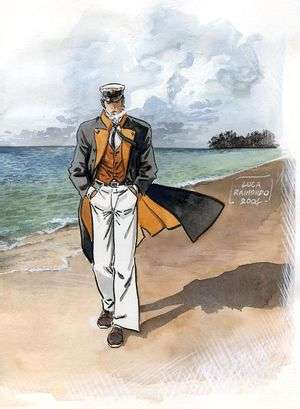Corto Maltese

Corto Maltese is a graphic novel series by Hugo Pratt, and one of the most famous examples of the French-Belgian comics school at its best (even though the author was actually Italian).
The title character is a fictional adventurer active during the years before, during and after WW 1. Born of a sailor from Cornwall and a fortune-teller from Gibraltar, Corto Maltese has a lifelong case of wanderlust and travels across the world as a gentleman of fortune, treasure seeker and occasional pirate. His recurring sidekick is a psychopathic Russian named Rasputin (who coincidentally does look like the historical Rasputin).
An Animated Adaptation was released in 2002, Corto Maltese et la Cour Secrète des Arcanes.
If you've never read the comics but the name sounds familiar, it's because Frank Miller used the character's name as that of a fictional country in The Dark Knight Returns, which was in itself given a Shout-Out in the '89 Batman film.
- All Just a Dream: In "Mushroom Head."
- All Myths Are True: Corto gets to meet mythical creatures from plenty of different folklores.
- Anti-Hero: Corto is an early example of this.
- Arbitrary Skepticism: Corto insists that Cornwall is a place of magic and that Malta is full of ghosts. But mystic powers in the Caribbean? That's just superstition.
- Armies Are Evil: Corto meets his share of power-hungry warlords and unsavory military officers.
- Asian Gal with White Guy: Played with in the case of the unfulfilled attraction between Corto and Shanghai Li. She was already married and more or less happy with her husband, whom she basically describes as a Nice Guy. Corto acknowledges it and wishes her well.
- Badass Longcoat: Corto.
- Badass Normal: Corto acquits himself admirably in every dangerous situation, realistic or fantastic, although he is far from being infallible; sometimes, when the focus shifts to secondary characters, he is a little more than a bystander.
- The Casanova: Corto, with a hint of Chivalrous Pervert.
- Crouching Moron, Hidden Badass: Rasputin.
- The Dead Can Dance: And in "The Helvetics", Corto dances with them.
- Die Laughing: Corto, in "Mushroom Head." Fortunately, it was a dream produced by Magic Mushrooms -- and it wasn't Corto's dream....
- Doppelganger: In "The Golden House of Samarkand", the Turkish officer Timur Chevket is a dead ringer for Corto. Not to mention, of course, Rasputin's resemblance with his more famous namesake.
- The Drifter: Corto never stays in any one place too long.
- Expanded Universe: Two characters from two of Pratt's other works, "Lord HawHaw" from Ann of the Jungle and Cush from The Scorpions of the Desert appear in "Corto Maltese in Africa" ("Les Ethiopiques" in France), the second as a close friend of Corto, making those three universes linked together in the same verse.
- Foe Yay: Lampshaded in the case of Corto and Rasputin.
- Foil: Rasputin is a dark version of Corto.
- Fortune Teller: Corto's mother was one, and so is his friend Golden Mouth.
- Heartbroken Badass: Corto never quite got over his love for Pandora Groovesnore in "The Ballad of the Salty Sea".
- Historical Domain Character: Corto meets the Red Baron.
- Identity Amnesia: Happens to Corto in "Because of a Gull".
- Magical Realism: Real locations and historical events coexist with magic elements and pure fantasy.
- Mildly Military: Corto's default outfit is a navy uniform of no particular nationality (he once claimed to belong to the Venetian navy, but that was a lie he made up on the spot).
- Needle in a Stack of Needles: In "Burlesque entre Zuydcoote et Bray-Dunes", the last story in "The Celtics", a killer disguised as a wooden puppet hides in a room full of similar wooden puppets.
- Older Than She Looks or possibly Really Seven Hundred Years Old: Gold Mouth looks "surprisingly young ... and yet there are very old women in Bahia who swear that she has always looked this way." She claims, too, to have known Corto's great-grandfather. He points out that this would have to make her over a hundred years old.
- Pirate: When first encountered in "The Ballad of the Salty Sea", Corto and Rasputin are pirate captains in the Indonesian archipelago.
- La Résistance: "Concerto in O' Minor for Harp and Nitroglycerin" is about the Irish uprising against British rule.
- Ragtag Bunch of Misfits: Corto is often joined by characters so weird that they make even him and Rasputin look balanced by comparison.
- Recycled in World War I: The plot in "Under the Flag of Gold" turns out rather like that of Kelly's Heroes, with Corto masterminding a plan that unites small units of French and Scottish soldiers, two American ambulance drivers, a Greek gunboat crew, and an Austro-Hungarian artillery observer to, ahem, "retrieve" lost gold from northern Italy in 1917.
- Sliding Scale of Idealism Versus Cynicism: The series is curiously impossible to classify, oscillating between a dream-like, nostalgic, elegiac tone on one hand and bitter, realistic cynicism on the other. Corto himself can sound both like the Man with No Name and a hopeless romantic.
- Sliding Scale of Silliness Versus Seriousness: a poignant, dramatic scene can be followed by a light-hearted one, often involving Rasputin. Strangely enough, it works.
- Shoot the Shaggy Dog: Some characters are liable to die pointlessly.
- Shout-Out: Lots of them. To A Midsummer Night's Dream, Hearts of Darkness, Shanghai Express and more.
- Smoking Is Cool: Corto smokes cigarillos.
- Sociopathic Hero: Rasputin.
- Tall, Dark and Handsome: Corto's good looks leave few women indifferent.
- Warrior Poet: Corto is a fine example of this trope. Literally, in fact: during a gunfight, he recites a poem by Rimbaud to himself as bullets fly all around.
- WW 1: Several of Corto's adventures take place on the Western front.